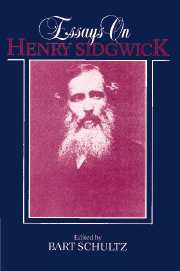Book contents
- Frontmatter
- Contents
- Foreword
- Acknowledgments
- List of contributors
- List of abbreviations
- Introduction: Henry Sidgwick today
- PART I Common-sense morality, deontology, utilitarianism
- PART II Egoism, dualism, identity
- 5 Sidgwick's pessimism
- 6 Sidgwick and the history of ethical dualism
- 7 Sidgwick and the rationale for rational egoism
- 8 Sidgwick on ethical judgment
- PART III Hedonism, good, perfection
- PART IV History, politics, pragmatism
- Index
6 - Sidgwick and the history of ethical dualism
Published online by Cambridge University Press: 05 June 2012
- Frontmatter
- Contents
- Foreword
- Acknowledgments
- List of contributors
- List of abbreviations
- Introduction: Henry Sidgwick today
- PART I Common-sense morality, deontology, utilitarianism
- PART II Egoism, dualism, identity
- 5 Sidgwick's pessimism
- 6 Sidgwick and the history of ethical dualism
- 7 Sidgwick and the rationale for rational egoism
- 8 Sidgwick on ethical judgment
- PART III Hedonism, good, perfection
- PART IV History, politics, pragmatism
- Index
Summary
Some years ago I published a short systematic study of Sidgwick's dualism of practical reason; here I propose to complement it with a study of his views about the history of that dualism, using both The Methods of Ethics, which contains many passages on the history of ethics, and especially Outlines of the History of Ethics. My two studies will, of course, overlap somewhat, and this one may embody some changes in my interpretations of Sidgwick (which I shall not spell out), since I mean to deal not only with his account of the history of ethical dualism before The Methods of Ethics but with the place of The Methods of Ethics in that history.
In what is arguably his most interesting remark about the history of ethics Sidgwick writes as follows:
Butler's express statement of the duality of the regulative principles in human nature constitutes an important step in ethical speculation; since it brings into clear view the most fundamental difference between the ethical thought of modern England and that of the old Greco-Roman world.… [I]n Platonism and Stoicism, and in Greek moral philosophy generally, but one regulative and governing faculty is recognized under the name of Reason – however the regulation of Reason may be understood; in the modern ethical view, when it has worked itself clear, there are found to be two – Universal Reason and Egoistic Reason, or Conscience and Self-love.
(OHE, 197 f.; emphasis added)- Type
- Chapter
- Information
- Essays on Henry Sidgwick , pp. 175 - 198Publisher: Cambridge University PressPrint publication year: 1992
- 15
- Cited by



